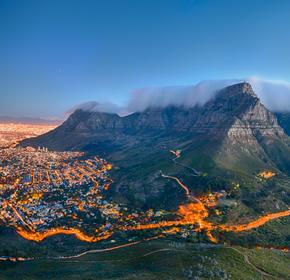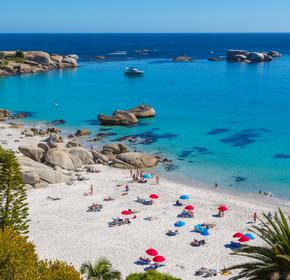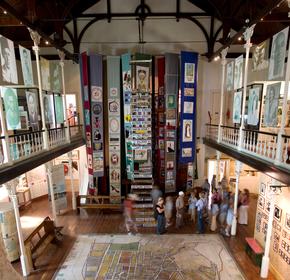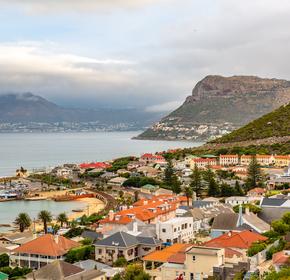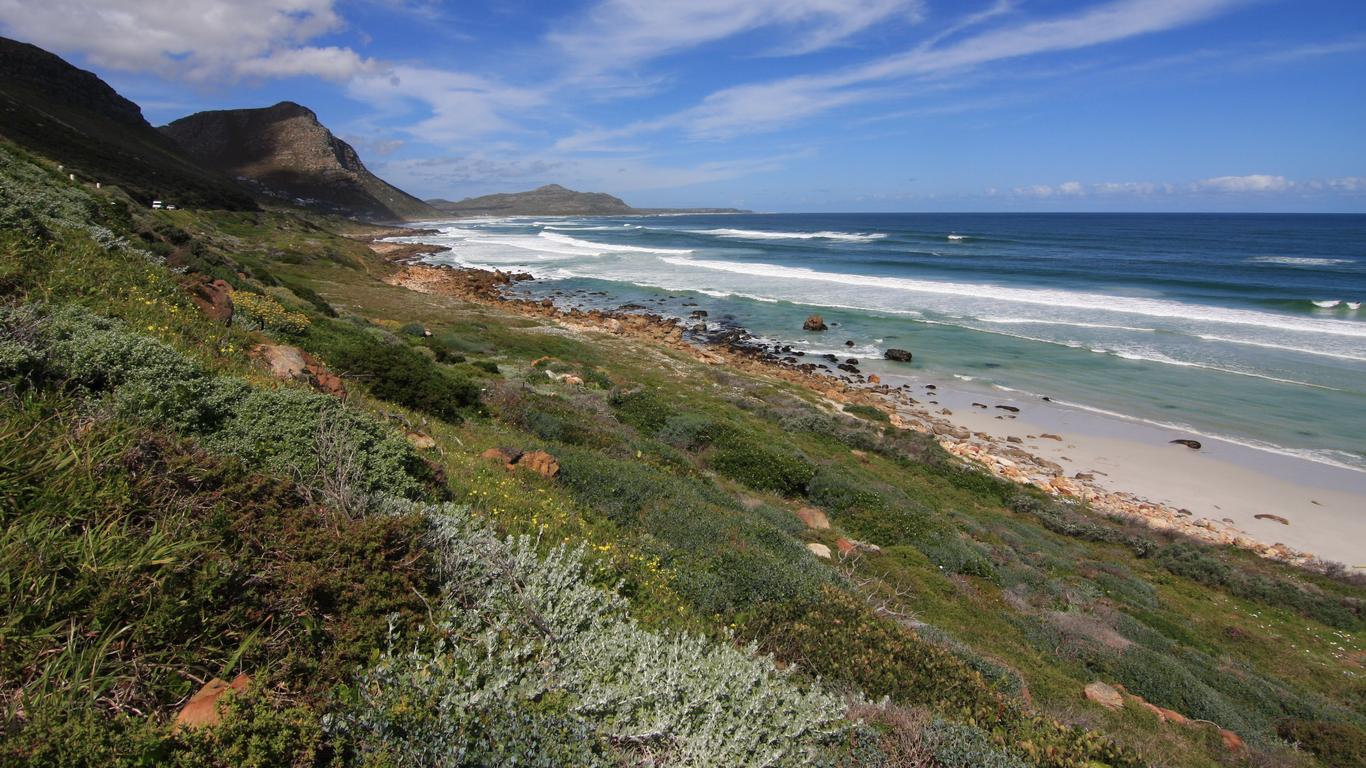
Cape Town travel guide
Cape Town Tourism | Cape Town Guide
You're Going to Love Cape Town
From the sparkling waters of the ocean to the top of Table Mountain, Cape Town will sweep you away with its beauty. In the rejuvenated facades and busy city streets, you'll find a vibrant, multicultural society with much to explore.
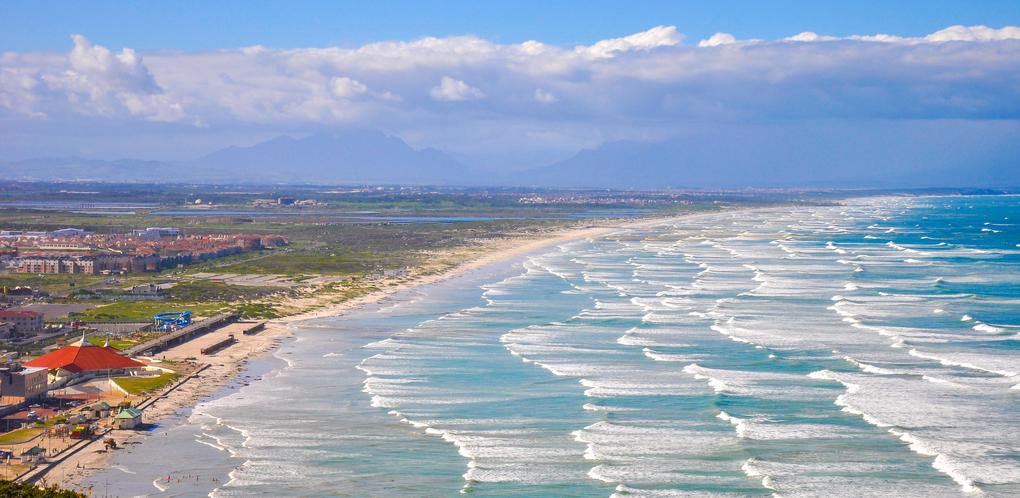
Cape Town lies on the southwest coast of South Africa and incorporates the Cape Peninsula around False Bay. Cape Town is South Africa's second biggest city, often called the "Mother City" for its key role in the country's evolution.
Apart from its natural beauty, Cape Town has its own stylish flair, with a diverse population. The city is full of striking buildings and features like the eye-popping colors of the historic Bo Kaap neighborhood to the arresting Afrocentric design of chic restaurants and lounges, and street art in the East City. From art and design to a thriving nightlife scene, Cape Town is an adventure waiting to be explored.
Top 5 Reasons to Visit Cape Town
1. The Stunning Views
Cape Town is situated in a breathtaking part of the world, covering a sweeping area from seaside to mountain. A ride up the Table Mountain - so-called because of its flat, rocky top - in a cable car offers spectacular views of the city below, and you can hike around the Table Mountain National Park.
2. The Great Outdoors
Where else can you go surfing in the morning, hiking up a mountainside at lunch, and then squeeze in penguin watching at Boulders Penguin Colony before dinner? The Winelands, just an hour outside of the city, allow you to explore world renowned viticulture. Cape Town offers a wealth of outdoor adventures to captivate everyone from serious athletes to casual vacationers looking for something new to try.
3. The Mother of Modern South Africa
Like the rest of South Africa, Cape Town has a turbulent past. Robben Island, now a museum, was once the prison home of Nelson Mandela. Tours by boat leave daily, allowing you to explore the grounds of the erstwhile prison, now a UNESCO World Heritage site.
4. City of Design and Culture
From First Thursdays - a kind of giant art party on the first Thursday night of every month - to Cape Town Fashion Week to the world-renowned Cape Town International Jazz Festival, arts and culture abound. There are concerts, gallery openings, and museums to check out, and the Mother City has a reputation for serving as a launching pad for exciting new artists.
5. The Nightlife
You can't really say that you've been to Cape Town until you've explored its world-class nightlife, offering everything from dance clubs and live music venues to hipster bars and upscale lounges.
What to do in Cape Town
1. Table Mountain: Hoerikwaggo
The icon of Cape Town, this natural wonder gets is named after the 2-mile wide plateau at the top. Hiking enthusiasts would be remiss to skip the climb, and there are many routes available for varying skill levels, each trail more exciting than the next. The flora and fauna do not disappoint, not to mention the stunning views from the top.
2. Camps Bay Beach: Sunning in the Stunning Bay
A short way from the city center lies Camps Bay Beach, attracting visitors with its palm-lined beaches and incomparable waters. Let the white sand tickle your toes and dazzle your eyes beneath the perfect sun, and take in the beauty of the landscape. Worlds away from the busy city, Camps Bay has prime facilities - pretty much everything you might need. The popular Clifton Beach isn't far either.
3. Robben Island: Hands on History
Nelson Mandela is arguably one of the most famous South Africans in the world, and this is the prison island where he spent 18 years of his life, before the fall of Apartheid. Tourists interested in the complex history of the nation can enjoy a boat ride to Robben Island across the bay. Once there, the remarkable museum offers guided tours lead by former prisoners willing to share their experiences. Away from the penitentiary one, the only colony you'll find today consists of cute penguins!
4. Victoria & Alfred Waterfront: Take a Trip Downtown
South Africa's oldest working harbor is now a popular attraction filled with restaurants, shops, museums and theaters. This is the ultimate destination in the city center no matter what your interests might be. The Two Oceans Aquarium is world renowned, and the Diamond Museum chronicles diamond mining and cutting. Nearby, the red Clocktower is a symbol of history and a well maintained architectural sight, whose technical mechanisms can be admired from the inside.
5. District Six Museum: Not so Far into the Past
The history of Apartheid in South Africa is an unpleasant one, whose details are explained and commemorated in this museum as a cautionary tale. District Six was a neighborhood of Cape Town, from which 60,000 marginalized, non-white residents were expelled during the 20th century, uprooted from their homes. The institution gives voices back to those who were removed and silenced, displaying hand-written memories of demolished places in a moving and deeply human exhibition.
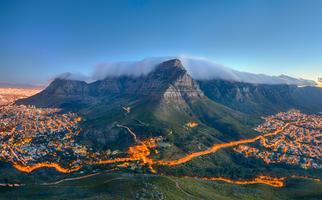
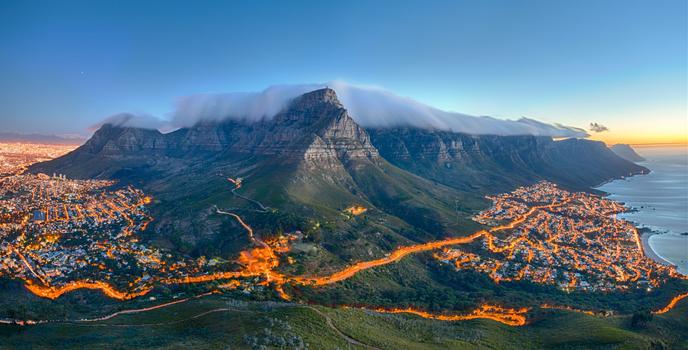
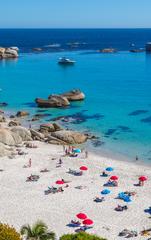
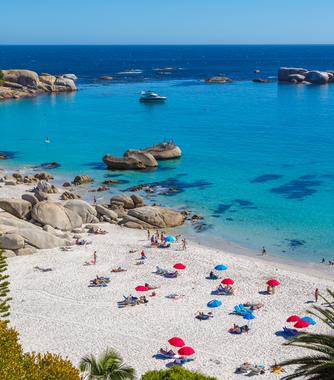




1. Table Mountain: Hoerikwaggo
The icon of Cape Town, this natural wonder gets is named after the 2-mile wide plateau at the top. Hiking enthusiasts would be remiss to skip the climb, and there are many routes available for varying skill levels, each trail more exciting than the next. The flora and fauna do not disappoint, not to mention the stunning views from the top.
2. Camps Bay Beach: Sunning in the Stunning Bay
A short way from the city center lies Camps Bay Beach, attracting visitors with its palm-lined beaches and incomparable waters. Let the white sand tickle your toes and dazzle your eyes beneath the perfect sun, and take in the beauty of the landscape. Worlds away from the busy city, Camps Bay has prime facilities - pretty much everything you might need. The popular Clifton Beach isn't far either.
3. Robben Island: Hands on History
Nelson Mandela is arguably one of the most famous South Africans in the world, and this is the prison island where he spent 18 years of his life, before the fall of Apartheid. Tourists interested in the complex history of the nation can enjoy a boat ride to Robben Island across the bay. Once there, the remarkable museum offers guided tours lead by former prisoners willing to share their experiences. Away from the penitentiary one, the only colony you'll find today consists of cute penguins!
4. Victoria & Alfred Waterfront: Take a Trip Downtown
South Africa's oldest working harbor is now a popular attraction filled with restaurants, shops, museums and theaters. This is the ultimate destination in the city center no matter what your interests might be. The Two Oceans Aquarium is world renowned, and the Diamond Museum chronicles diamond mining and cutting. Nearby, the red Clocktower is a symbol of history and a well maintained architectural sight, whose technical mechanisms can be admired from the inside.
5. District Six Museum: Not so Far into the Past
The history of Apartheid in South Africa is an unpleasant one, whose details are explained and commemorated in this museum as a cautionary tale. District Six was a neighborhood of Cape Town, from which 60,000 marginalized, non-white residents were expelled during the 20th century, uprooted from their homes. The institution gives voices back to those who were removed and silenced, displaying hand-written memories of demolished places in a moving and deeply human exhibition.








Where to Eat in Cape Town
Dining in Cape Town is a multicultural affair. Seafood is a regional specialty, showcased on the menu at places like Pigalle Restaurant in Green Point, with main dishes starting at R200. Mzansi offers an authentic township experience, where the food is cooked in a home in the Langa township and served buffet style for less than R150 per person, including drinks and tip. There are many fine Indian restaurants, including the Bombay Brasserie, a luxurious retreat with an imaginative menu that starts at R70 for mains. There are also French, European, Israeli, and Asian options at all price points.
When to visit Cape Town
Summer in Cape Town runs from about December to February, with average temperatures in the high 70s during the day. It's the most popular time for vacationers. For fewer crowds and lower prices, choose March to May, or September to November when the weather is more temperate. Winter, from June to August, sees cool temperatures that can average in the mid-40s at night and frequent rains. Many people come to Cape Town for specific event like the Cape Town International Jazz Festival in April of every year.
How to Get to Cape Town
Plane
Cape Town International Airport (CPT) is the second busiest airport in the country, with many direct flights to many places across the world. It is located about 12 miles from the city center. MyCiTi shuttle is a rapid bus system between the airport and the City Centre bus station on Hertzog Blvd. There are departures ever 20 minutes, with fares ranging from R80 during off hours to R88 in peak periods.
Train
The Cape Town station is located in the central business district of the city and acts as a hub for the Metrorail Western Cape commuter rail network. It also services Shosholoza Meyl, the national inter-city train, with daily runs to and from Johannesburg. It is also serviced by Rovos Rail and the Blue Line tourist rail companies.
Car
The N2 freeway approaches Cape Town from the southeast and Port Elizabeth, an express route, while the old R310 offers a more scenic route along the water. The N1 comes from the northeast, extending through Paarl and all the way to Johannesburg.
Bus
The Greyhound Bus and Intercape Bus Terminals, connecting with the Cape Town Train Station, and the MyCiTi Civic Centre Bus Station, are all located within a few blocks of each other near the intersection of Adderley and Strand Streets in downtown Cape Town. Greyhound, SA Roadlink Bus, Intercape Intercity Bus Liners, and TransLux bus line connect the city with most of the cities of South Africa.
Airports near Cape Town
Airlines serving Cape Town
Where to stay in Cape Town
City Bowl - this incorporates the city's center, a busy business district, and an area where you'll find a diverse selection of restaurants, shops, and entertainment choices. Bree Street is the hub of the nightlife scene.
Popular Neighborhoods in Cape Town
The Waterfront - the most popular way to experience the waterfront is through the massive V&A Waterfront, a huge plaza set within the city's working harbor area. It incorporates theaters and cinemas in addition to a range of restaurants, shops, boutiques, and authentic local artisan craft shops.
De Waterkant, Green Point, Mouille Point and Sea Point - this sounds like a lot of ground, but it covers the area along the Atlantic coast up to Signal Hill. At one time a commercial area, it has evolved into a stylish district with unique shopping finds, many restaurants, and scenic seaside promenade.
Where to stay in popular areas of Cape Town
Most booked hotels in Cape Town
How to Get Around Cape Town
Public Transportation
The MyCiTi service is the city's most extensive, with a hub at the MyCiTi Civic Centre Bus Station downtown. Fares are based on the designated time period when you begin your trip, with peak pricing during morning and afternoon rush hour periods on weekdays. The maximum fare for 0-5km trip during peak periods is R12.60. A 30 percent discount on all fares is available by purchasing a MyCiTi Mover card, an electronic payment system that is available from ticket booths and kiosks around the city.
Taxi
Taxis are plentiful and safe throughout most areas of Cape Town. They cannot be hailed from curbside, but you are likely to find them at major tourist areas such as the waterfront area. Your hotel concierge or waiter at the restaurant can call one for you. Fares for a six-mile trip run about R200.
Car
Car rentals are available from a variety of carriers at the airport, with compact rentals starting at about R840. Parking is reasonably plentiful on city streets, with fees collected by parking personnel in cash at about R5 for an hour. Parking on public lots starts at R3.50 for the first half hour, and is free on Sundays and holidays.
Best car hire deals in Cape Town
Compact
4 Adults, 2 Bags
RM 129/day
People carrier
5 Adults, 3 Bags
RM 273/day
The Cost of Living in Cape Town
Shopping Streets
Shopaholics will find a lot to check out in Cape Town, from luxury boutiques to bargain hunting at markets. The V&A (Victoria and Alfred) Waterfront is the place to find luxury goods and boutiques of all kinds, set against the backdrop of Cape Town's harbor. Small back-street shops and factory stores are where to find bargains in the Mother City, along with the large Milnerton Flea Market and stalls along Marine Drive.
Groceries and Other
There are many options when it comes to groceries in Cape Town, including Spar, with a good selection of foods along with a bakery and liquor store at most locations across town. Pick n Pay is another multi-location chain around town. The food section at Woolworth's offers more limited choices, and Shoprite offers food basics at bargain prices. One gallon of milk should cost just under R50 on average, while a dozen eggs will run about R25.
